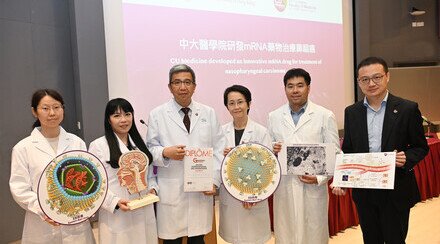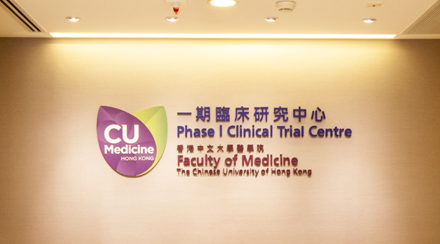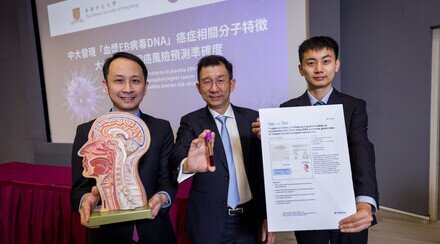A CUHK-led International Study Demonstrates Immune-checkpoint Inhibitor Is Effective in Patients with Advanced Nasopharyngeal Cancer
Researchers from the Faculty of Medicine at The Chinese University of Hong Kong (CUHK) led an international study funded by the Cancer Therapy Evaluation Program, Division of Cancer Treatment and Diagnosis, National Cancer Institute (NCI), part of the National Institutes of Health, with the Mayo Clinic Phase 2 Consortium of the United States. The study demonstrated the anti-tumour activity of the immune-checkpoint inhibitor in recurrent and metastatic nasopharyngeal cancer (NPC) patients. Results show the 1-year overall survival rate was around 60%. Further analysis facilitates the identification of biomarkers and the development of immunotherapy in NPC patients. The findings of this landmark study have been published in the Journal of Clinical Oncology.
NPC is endemic to Hong Kong, Southern China and other parts of Southeast Asia. According to the Hong Kong Cancer Registry, NPC was the 6th most common cancer for men and the 10th most common cancer for both sexes in 2015.
NPC is characterized by the infection of Epstein-Barr virus (EBV). It is one of the most aggressive head and neck cancers and frequently metastasizes to distant lymph nodes and organs. Conventional treatments of NPC are radiotherapy and chemotherapy.
Immunotherapy as a new treatment option for NPC patients
In recent years, cancer immunology has become a rapidly advancing field. The field has produced a new method of treating cancers, known as immunotherapy, that augments a patient’s own immune response against tumours.
NCI, the US government’s principal agency for cancer studies as well as the largest funder of cancer research in the world, has been supporting research that advances the outcomes of cancer immunotherapy. In order to evaluate the antitumour activity of the immune-checkpoint inhibitor, nivolumab, in patients with recurrent or metastatic NPC, NCI has supported an international, multicentre study of the Mayo Clinic Phase 2 Consortium led by CUHK medical professors.
Study shows median overall survival as 17 months since the treatment
A total of 44 patients with recurrent and metastatic NPC from 11 international sites were recruited from 2015 to 2016, with the majority being Asians. The overall response rate was 20%, with one patient’s cancer going into complete clinical remission for around one year. The overall survival rate of 60% at 1 year compares favourably with historic data from similar patients who received other therapies for metastatic NPC, where the overall survival rate at 1 year is usually less than 50%.
Professor Brigette Buig Yue MA of the Department of Clinical Oncology at the Faculty of Medicine at CUHK is an executive member of the NCI Head and Neck Cancer Steering Committee - Clinical Trials Planning Group on Nasopharyngeal Cancer, and Co-chair of the Widely Metastatic Group. She explained, “The majority of patients with recurrent and metastatic NPC are not amenable to curative treatment, where the therapeutic option is largely limited to palliative chemotherapy. Our study findings reveal that the immune-checkpoint inhibitor has clinically meaningful and durable activity in some patients with NPC, the treatment was well tolerated and seemed to have fewer serious side effects than chemotherapy.” Professor Ma highlighted that, “It was an honour to work with this excellent team of investigators who have worked tirelessly to complete this study in record time.”
Patients with better treatment outcomes are associated with specific biomarkers
In 2017, researchers of the Faculty of Medicine at CUHK unravelled the whole genome of NPC which enables the discovery of novel and key targets and biomarkers of this common type of head and neck cancer. In the current study, the research team also found that patients who responded to nivolumab or those with better progression-free survival may be related to the expression of biomarkers named PD-L1 and HLA proteins in their tumours.
Professor Kwok Wai LO of the Department of Anatomical and Cellular Pathology at the Faculty of Medicine at CUHK stated, “Validation in larger cohorts for the clinical utility of PD-L1 expression on response to nivolumab and the prognostic significance of HLA proteins expression in nivolumab-treated patients will be worked on. We hope by identifying the biomarkers in NPC patients, the prognosis assessment as well as the development of precision medicine could be facilitated, hence enhancing the treatment outcomes.”
Professor Anthony Tak Cheung CHAN, Li Shu Fan Medical Foundation Professor of Clinical Oncology and Director of Sir YK Pao Centre for Cancer at the Hong Kong Cancer Institute at the Faculty of Medicine of CUHK added, “It is our honour to lead this international study funded by NCI and work with world-class experts, including those from Mayo Clinic. This is the first report in literature on the clinical activity and biomarker of response to nivolumab in recurrent and metastatic NPC. With the latest discovery, together with multiple clinical and translational studies we conducted in previous years, we have established advances for NPC treatments. We will continue to further our research efforts on the field of cancer immunotherapy and strive to extend the benefits of immunotherapy to more cancer patients.”

Researchers from the Faculty of Medicine at CUHK led an international study which demonstrates the anti-tumour activity of immunotherapy in recurrent and metastatic nasopharyngeal cancer (NPC) patients. Results show the 1-year overall survival rate was around 60%. (From left) Professor Kwok Wai LO of the Department of Anatomical and Cellular Pathology; Professor Brigette MA of the Department of Clinical Oncology; NPC patient Mr CHAN (pseudo name) and Professor Anthony CHAN, Li Shu Fan Medical Foundation Professor of Clinical Oncology.

Mr CHAN (pseudo name, right), an NPC patient, states that his physical condition and life quality were not seriously affected during immunotherapy, and there were fewer side effects than chemotherapy.

Professor Brigette MA states that the study findings reveal immunotherapy has clinically meaningful and durable activity in some NPC patients.
Professor Anthony CHAN says that the CUHK Medicine research team is honoured to lead the international study funded by National Cancer Institute in the United States and work with world-class experts, including those from Mayo Clinic.

Professor Kwok Wai LO (left) hopes that by identifying the biomarkers in NPC patients, the prognosis assessment as well as the development of precision medicine could be facilitated, hence enhancing the treatment outcomes for advanced NPC patients.




























































